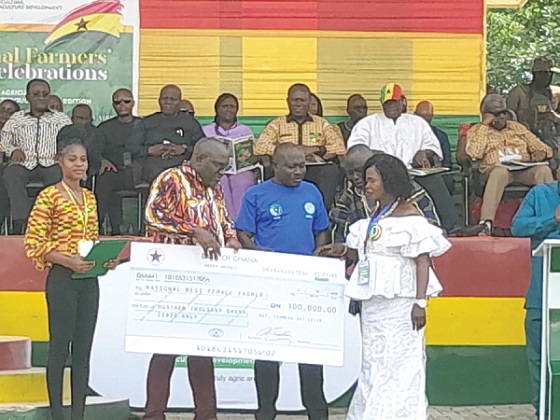
17 Years of integrated farming pays off...As Yaa Ajeley is declared Best Female farmer 2022
Her decision to practise the principles of integrated farming, where she combines crops and animal production, easily projects her as high and above her peers.
Her farm, Yaa Ajeley’s farm, uses the grains and crop residue to feed the animals and also use the animal droppings as manure to fertilise her fields while selling the crops to support the animal enterprise.
Advertisement
Farm size
She currently owns an 85-acre cocoa/banana farm, 16 acres of plantain/cocoyam farm, 30 acres of okro farm, eight acres of garden eggs, six acreage each of tomato and cassava as well as five acres of cocoyam among other crops.
For animal farming, she has 800 local fowls, 800 snails, 45 pigs, 16 sheep, nine rabbits and six sheep.
For these and many others, the 64-year-old farmer from the Wassa Amenfi East District of the Western Region, easily stood tall when the names of female farmers were mentioned.
With 17 years farming experience, Yaa Ajeley mounted the podium to applause to be crowned as the Best Female Farmer for the year 2022.
For her prize, Madam Ajeley took home ¢100,000 cheque and other souvenirs.
A member of the Nyamebetsere Farmer's Association, the affable Madam Ajeley won the District Best Farmer award in 2017 and was adjudged the 2021 Best Woman in Agriculture in the district.
Integrated farming
With her integrated farming, Madam Ajeley feeds her animals primarily with crop residues, cassava leaves, grass and by-products from the farm, especially during the dry season.
She ensures that her animals are good and healthy by being deliberate on routine medication, vaccination as well as periodic monitoring by veterinary officers.
Her marketing strategies include sale in the open market, farm gates and also supplies to the government buffer stock.
Madam Ajeley’s knowledge and appreciation of good agricultural practices is top notch as she depends on the Ministry of Food and Agriculture and other certified sources for planting materials.
For the crops (pepper) that are nursed before transplanting, she demonstrates good understanding of best nursery management practices.
She carries out all her farm operations manually, while relying on both organic and inorganic fertilisers to improve the fertility of the soil.
In the event of disease and pest outbreak, Madam Ajeley consults the district department of the Ministry of Food and Agriculture for recommendations on the most appropriate chemical to control them.
In terms of good animal husbandry practices, the farmer is motivated by financial benefits from the sale of animals in the choice of the animal species to keep.
Environmental issues
Major environmental factors militating against the farmer’s production activities include bushfires, floods, misuse of agrochemicals and drought.
In addressing these environmental challenges, the farmer establishes firebelts with trees to control bushfires and creating of channels to facilitate drainage of excess water on the fields during floods.
Prior to the use of chemicals on the field, the farmer provides her workers with the requisite PPEs such as the overall dress, wellington boots, hand gloves and nose masks.
Chemical containers are buried after use.
Constraints
For Madam Ajeley, the high labour cost, poor farm roads, incidence of pest and diseases and also financial challenges are the major constraints in her farming enterprise.
In coping with the challenges, she depends on labour from neighbouring towns, undertakes periodic repair of the roads leading to the farms, and also relies on AEA’s when there is an outbreak of pest and diseases.
She also ploughs back her resources into her farming business.
Record keeping
She is meticulous with record keeping on crop and animal production operations consistently and regularly kept it over the years in a manner that is satisfactory.
Madam Ajeley works closely with the extension agents of the Department of Agriculture, adopting improved farming technologies.
These technologies have contributed positively to increased farm productivity.
Specific technologies adopted by the farmer include the following:
Role of Farmer in the Community
Madam Ajeley is easily a role model not only for females, but both female and male farmers.
She shares information with other farmers and also willingly allows other farmers to visit her farms to learn best practices.
As part of her social responsibility to her community, she has supported the Asako SHS with plantain, pays school fees for eight students and supported farmers with suckers.



